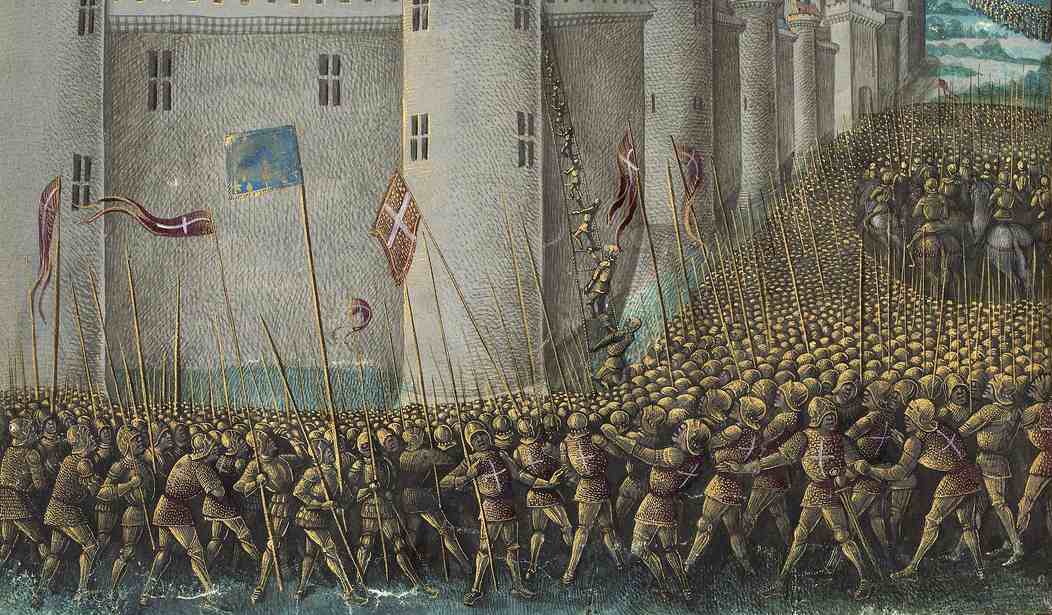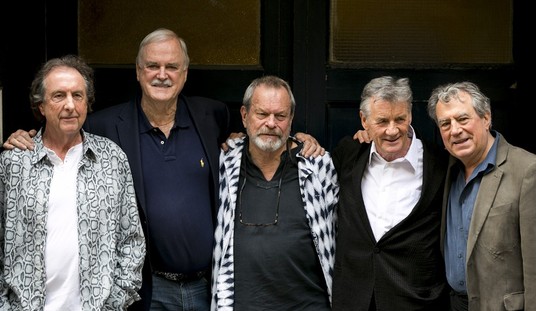Nine-hundred and twenty-five years ago today, on June 3, 1098, a dramatic Christian victory over Islamic oppression took place: the liberation of the ancient Christian city of Antioch.
Context: In the years preceding the First Crusade, Turkish invaders were running amok in Asia Minor, formerly a bastion of Christianity (now “Turkey”). An anonymous Georgian chronicler tells of how “holy churches served as stables for their horses,” the “priests were immolated during the Holy Communion itself,” the “virgins defiled, the youths circumcised, and the infants taken away.” Similarly, Anna Comnena, the princess at Constantinople, tells of how “cities were obliterated, lands were plundered, and the whole of Anatolia was stained with Christian blood.”
Outraged to hear what was happening in the East, Christians from all over Europe, under the leadership of the Franks, set out on what would become known as The First Crusade (1096-1099). After entering and winning several battles in Turkic-controlled Asia Minor, by October 1097, the Europeans were at and besieging the walls of Antioch.
For long, Antioch had resisted Islam. Even when “all the East was shaken and the successors of Muhammad were subjugating by force entire provinces to their impious superstition and perverse dogma,” chronicler William of Tyre writes, Antioch had “as long as possible refused to bear the domination of an infidel nation,” that is, until its capture by the Turks in 1084.
Now, more than a decade later, its indigenous Christians were much oppressed by their Turkish master, Yaghi-Siyan, a notorious persecutor of Christians who had also converted Antioch’s ancient cathedral into a horse stable.
“Alas! How many Christians—Greeks, Syrians, and Armenians—who lived in the city, were killed by the maddened Turks,” lamented Fulcher of Chartres, who traveled with the crusaders. “With the Franks looking on, they threw outside the walls the heads of those [Christians] killed, with their petrariae and slings. This especially grieved our people.”
But because the Frankish and Norman warrior aristocracy had no qualms about giving tit for tat, Bohemond, a Norman leader who would go on to play a decisive role in the reconquest of Antioch, “brought those [Muslims] he had captured back to the gate of the city, where, to terrify the citizens who were watching, he ordered that they be decapitated” and their severed heads catapulted over the city walls. (Anna Comnena, who had met and described Bohemond as a towering “marvel for the eyes to behold,” added that “a certain charm hung about this man but was partly marred by a general air of the horrible.” He was clearly not one to be cowed by Islamic terror tactics.)
Another crusade leader, Duke Godfrey of Bouillon, also “performed there a famous deed worthy of remembrance forever”—to quote Robert the Monk, a contemporary—“a feat which rendered him illustrious in the eyes of the entire army.” During a particularly brutal battle before the walls of Antioch, a Turkish chieftain, “bolder than the rest, unusually heavily built and of greater strength… saw the Duke savaging his men mercilessly.”
[So the Muslim chief] urged his horse towards him with bloodstained spurs, and lifting his sword high, he sliced through the whole shield of the Duke, which he held above his head. If the Duke had not parried the blow with the boss of the shield and twisted over to the other side, he would have paid the debt of death…. The Duke, ablaze with furious anger, prepared to return the blow and thus aimed for his neck. He raised his sword and plunged it into the left side of his shoulder blades with such force that it split the chest down the middle, slashed through the spine and vital organs and, slippery with blood, came out unbroken above the right leg. As a result, the whole of the head and the right side slipped down into the water, whilst the part remaining on the horse was carried back into the city. All those inside rushed together to see this horrible sight, and were struck with amazement, panic and fear, overcome with terror; here there were screams like those of a woman in labor, their voices raised in misery, because he had been one of their emirs.
The terrified Muslims retreated back to Antioch and unleashed a “hailstorm of missiles and arrows” directly onto Godfrey, but he successfully absconded. It was a great victory and allowed the Christians to tighten the noose around the city.
Even so, it had now been nearly eight months since the Europeans first laid Antioch to siege, and still it would not be breached. Desperate crusaders were reduced to eating dogs, rats, and thistles. Many died of starvation, thirst, and pestilence.
Eventually, a Muslim tower captain—an Armenian Christian converted to Islam during Yaghi-Siyan’s persecutions—made a deal with Bohemond.
As a result, on today’s date, June 3, 1098, under the cover of night, the emaciated crusaders, having clandestinely climbed over the walls into the city, were running wildly and slaughtering anyone in the streets. “Those who were Christians chanted Kyrie Eleison”—the Christian mantra, “Lord have mercy,” in Greek—“to make it clear to our men that they were not Turks but Christians.”
Once their startle was over, these same Christians, “Syrians, Armenians, and the true believers of other nations, rejoiced exceedingly over what had happened. They at once took arms and joined forces with the army.” The result was a bloodbath not unlike those Muslims had visited upon Christian cities all throughout Asia Minor in the preceding decades.
Yaghi-Siyan managed to escape the carnage, but local Christians tracked, killed, beheaded and hurled their former tormentor’s head “into the view of all the Christian princes. The head was of enormous size, the ears very wide and hairy, his hair was white and he had a beard which flowed.”
The Europeans remained and recuperated in the ancient Christian city for the rest of the year. Bohemond was crowned prince of Antioch. The crusaders sent a letter to the pope in Rome, chronicling their tragedies and triumphs, and urged him to come in person to Antioch, reminding him that “it was here that the name Christian was born [Acts 11:26].”
The above account was excerpted from Raymond Ibrahim’s Defenders of the West: The Christian Heroes Who Stood Against Islam.










Join the conversation as a VIP Member